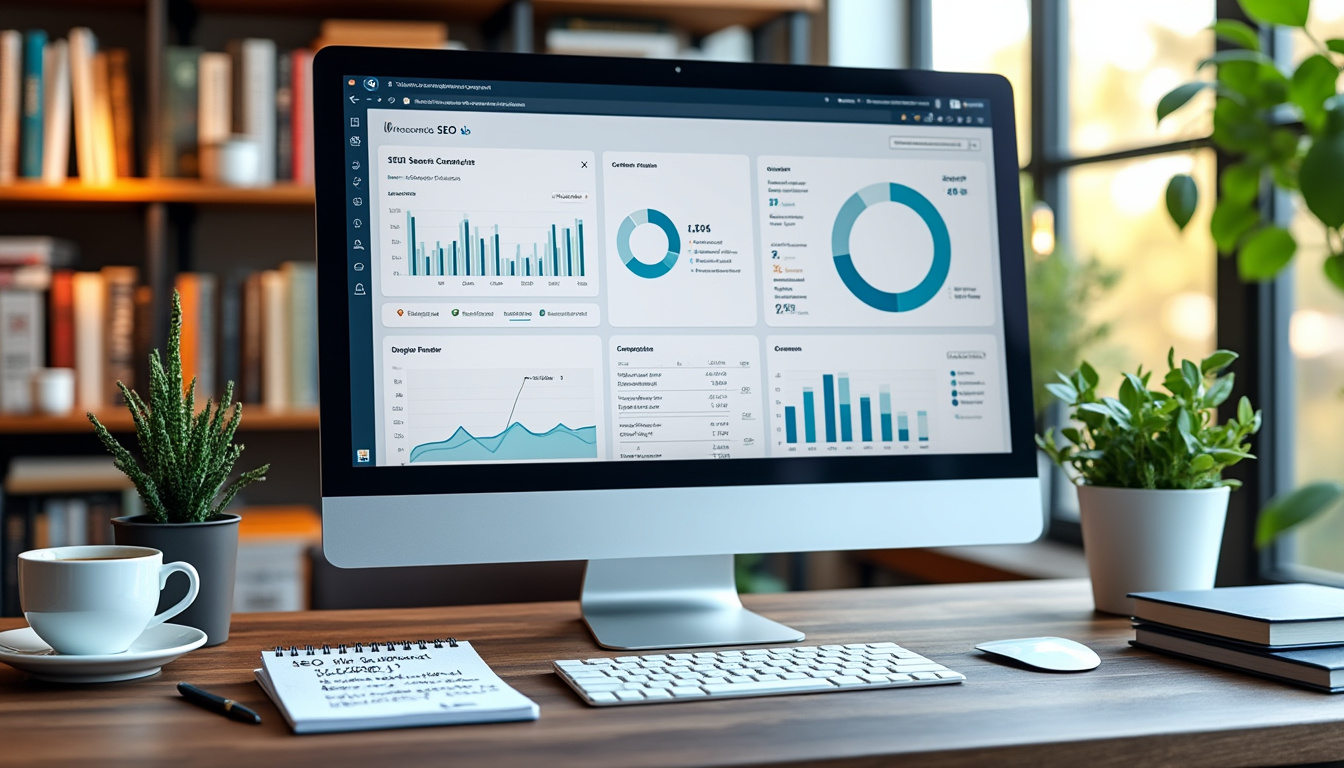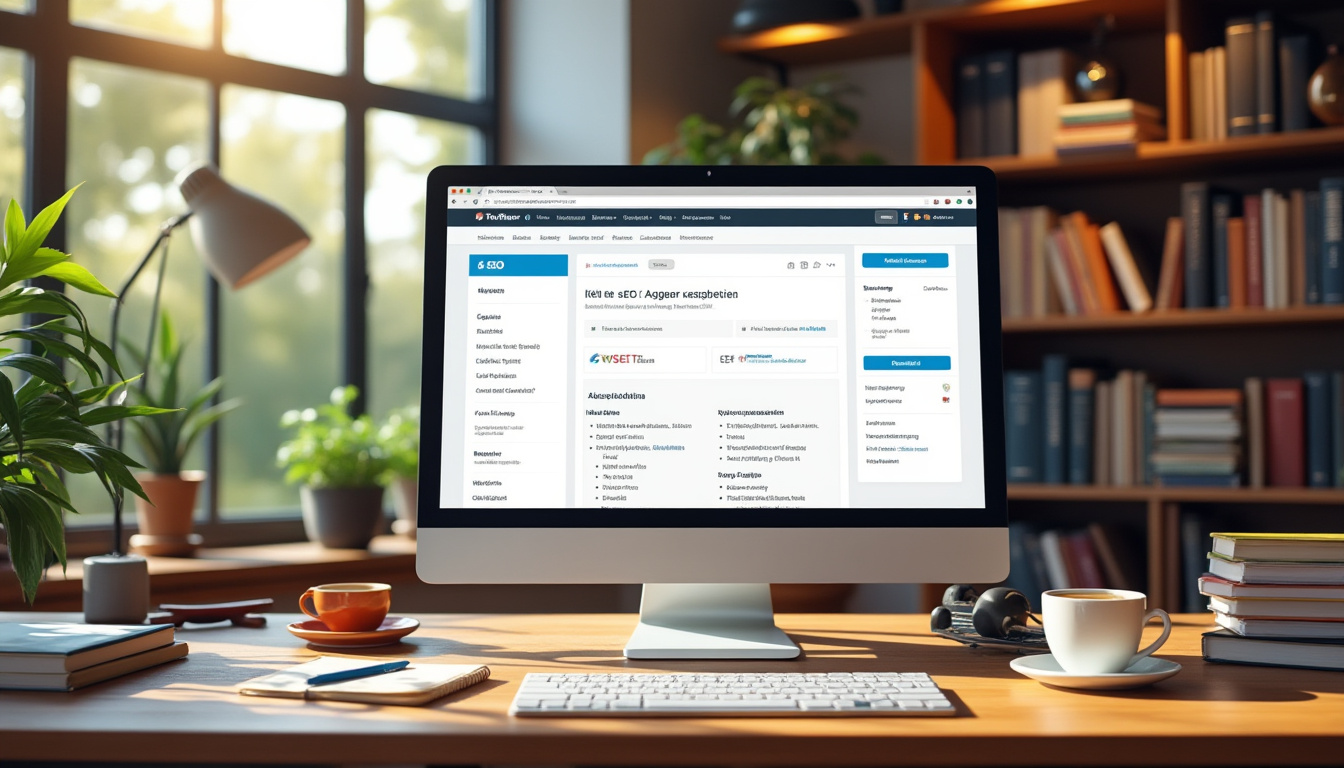To maintain SEO rankings for your WordPress site, it’s essential to focus on several key strategies. First, regularly update your site’s privacy settings and permalinks to ensure that search engines can index your content effectively. Implementing SEO plugins can also streamline optimization efforts by offering tools for keyword research, on-page SEO tweaks, and XML sitemaps generation.
Enhancing your site’s speed is crucial; utilize caching techniques, minimize code, and optimize images for better performance. Regularly create high-quality, relevant content that incorporates local SEO strategies to attract your target audience. Building backlinks and ensuring a clear, organized site structure further improves your visibility on search engines.
Finally, monitor your site’s performance and rankings to quickly address any fluctuations, ensuring ongoing optimization for sustained success.
Maintaining SEO rankings for your WordPress site is essential to ensure consistent traffic and visibility in search engines. By implementing effective strategies, such as optimizing your site’s structure, using the right plugins, and continually producing quality content, you can safeguard your rankings. This article will explore various techniques that can help you stay on top of search engine results, from checking visibility settings to enhancing user experience.
Review Your Visibility Settings
One of the first steps you should take in maintaining your SEO rankings is to regularly check your WordPress visibility settings. Access this option under Settings → General. Confirm that your site is visible to search engines. If you’ve set it to discourage search engines from indexing your site, it may affect your rankings significantly. Ensure that the relevant option is unchecked to allow search engines to crawl your website effectively.
Optimize Permalinks
Optimizing your permalinks is another crucial aspect of maintaining SEO for your WordPress site. Permalinks are the URLs generated for your pages and posts. A well-structured permalink can enhance both user experience and SEO. Under Settings → Permalinks, consider using a format that includes keywords relevant to your content. A common choice is the Post Name option, as it is concise and often more meaningful to users and search engines.
Utilize Tags and Categories
Tags and categories play a vital role in organizing your content and improving user navigation. By properly categorizing your posts and using relevant tags, you make it easier for users to find what they are looking for, which can reduce bounce rates and improve SEO. Ensure that you are using categories to group similar posts and tags to describe specific content. This creates a clear structure for both visitors and search engines.
Select the Right SEO Plugin
Choosing a quality SEO plugin is essential for maintaining your WordPress site’s rankings. Plugins like Yoast SEO or All in One SEO Pack provide invaluable tools for optimization. They help you with on-page SEO elements such as meta descriptions, keyword usage, and readability analysis. Regularly update your plugin to take advantage of the latest features and improvements. A well-configured SEO plugin can help you monitor your SEO health over time.
Implement XML Sitemaps
XML sitemaps are essential for helping search engines crawl your site effectively. They provide a blueprint of your website, making it easier for search engines to index your content. Most SEO plugins offer built-in options to generate XML sitemaps automatically. Ensure that your sitemap is submitted to Google Search Console, which can positively impact your site’s SEO by ensuring that all pages are indexed without any issues.
Focus on Site Speed
Site speed is a critical factor that influences your SEO rankings. Faster sites provide a better user experience and are preferred by search engines. To enhance your site’s speed, consider implementing caching solutions, optimizing images, and minimizing code. Tools like NitroPack can help streamline performance. Conduct regular speed tests to identify areas for improvement and optimize accordingly.
Conduct Keyword Research
Keywords are the foundation of any successful SEO plan. Conduct thorough keyword research to identify terms that your audience is searching for. Use tools like Google Keyword Planner to find relevant keywords with a good balance of search volume and competition. Integrate these keywords naturally into your content, headers, and metadata to improve your chances of ranking higher for those searches.
Create Quality Content Regularly
Producing high-quality content is perhaps the most important factor in maintaining your SEO rankings. Create content that is original, informative, and engaging for your audience. Ensure that your articles address specific questions or problems faced by your target audience. Moreover, update existing content periodically to keep it fresh and relevant. This not only aids in SEO but also encourages user retention and returning visits.
Utilize Internal and External Linking
Linking is another critical aspect of maintaining SEO. Internal links help search engines understand the relationship between different pages on your site, while external links can enhance your credibility by referring to authoritative sources. Make sure to include relevant internal links to your content and link out to credible external sources when appropriate. This practice not only improves SEO but also enriches the user experience.
Enhance User Experience
User experience directly impacts your site’s SEO rankings. A clean, navigable design encourages visitors to spend more time on your site, which can improve bounce rates and dwell time—both of which are considered by search engines during ranking calculations. Ensure that your site has a responsive design that performs well on various devices, and pay attention to loading times and the overall usability of navigation.
Monitor Your Backlinks
Backlinks are one of the most critical ranking factors in SEO. Ensure that your site is gaining high-quality backlinks from reputable sources. Regularly monitor your backlink profile using tools like Ahrefs or SEMrush. If you find any low-quality or toxic backlinks, consider disavowing them to prevent a potential negative impact on your rankings.
Keep Up with Algorithm Updates
Search engine algorithms evolve constantly, and staying updated can significantly affect your SEO strategy. Follow reputable SEO blogs and forums to learn about new updates and adjustments to ranking factors. Implementing best practices and adapting your strategy to algorithm changes can help maintain your site’s rankings over time.
Use Analytics and Monitoring Tools
Analytics tools are invaluable in tracking your SEO performance. Use Google Analytics and Google Search Console to gain insights into your site’s traffic, user behavior, and ranking positions. Regularly analyze this data to identify trends and areas for improvement. Evaluating your metrics allows you to make informed decisions about your SEO strategy and helps you stay on the right track in maintaining rankings.
Consider Local SEO
If you are running a local business, incorporating local SEO strategies can significantly improve your visibility in search results. This includes optimizing your Google My Business listing, creating localized content, and ensuring that your contact information is correctly displayed on your site. Engaging with local online communities and gathering reviews can also enhance your local presence.
Regularly Update Your Website
Keeping your website updated with fresh content is essential for maintaining SEO rankings. Regular updates signal to search engines that your site is active and relevant. This could include blog posts, news articles, product updates, or seasonal promotions. Regularly reviewing and updating your content also allows you to optimize for new keywords or trends in your industry.
Stay Consistent
SEO is not a one-off task but an ongoing process that requires consistency. Stay committed to your SEO efforts by regularly producing content, monitoring performance, and making iterative improvements. Establish a routine for reviewing your strategies and always be on the lookout for new opportunities to enhance your website’s visibility.
Final Thoughts
By implementing the strategies outlined here, you can effectively maintain your SEO rankings for your WordPress site. Remember that SEO is a long-term investment, requiring dedication and continuous effort to see lasting results. For more information on changing domains without affecting your SEO, you can visit this resource. Additionally, for insights on optimizing your WordPress database for better performance, refer to this guide. Don’t forget to engage with your audience online and keep them coming back by focusing on a superior user experience, which you can explore further through this article.

Maintaining SEO rankings for your WordPress site is essential for attracting organic traffic and ensuring your website remains visible in search engines. This article will guide you through effective strategies that are crucial for keeping your SEO rankings intact, from optimizing settings to enhancing site performance.
Optimize Your WordPress Settings
To maintain your SEO rankings, it is crucial to review your WordPress visibility settings. Navigate to Settings → General and ensure your site is set to be indexed by search engines. Adjusting these settings can significantly impact how search engine bots perceive your website. Additionally, make sure to properly configure your permalinks to enhance URL structure, making it easier for search engines to crawl your content.
Implement SEO-Friendly Practices
Using SEO plugins can be invaluable for managing your WordPress site’s optimization. Popular plugins like Yoast SEO or All in One SEO Pack provide useful features to help you fine-tune your content for search engines. Incorporate tags and categories to organize your content effectively, which aids in user navigation and improves your site’s architecture.
Create XML Sitemaps
Generating XML sitemaps is another essential step in maintaining your SEO. These sitemaps help search engines understand the structure of your website better. Most SEO plugins can create them automatically, making it easier for you to showcase your website’s content to search engines.
Enhance Site Performance
Site speed is a critical factor for SEO success. Utilizing caching, minimizing code, and optimizing images can dramatically enhance your site speed. Tools like NitroPack can assist in improving performance by streamlining your WordPress database and providing optimization recommendations.
Content Updates and Quality
Regularly updating your content and ensuring it meets the quality standards is vital for retaining your rankings. Create engaging, informative content that answers the needs of your audience. Utilize keyword research to identify relevant terms and phrases that can enhance your content visibility in search engines.
Monitor User Experience
Understanding how user experience impacts your SEO strategy is essential. Factors such as mobile responsiveness, website layout, and loading times can influence how users interact with your site, thus affecting its ranking. Regularly assess your website’s performance and make necessary adjustments to improve overall user satisfaction. Resources such as this guide offer insights into the impact of user experience on WordPress SEO.
Keep an Eye on Analytics
Utilizing tools such as Google Analytics can help you track your website’s performance and understand user behavior. Regularly reviewing your analytics data can provide insights into which areas of your site need improvement. Stay informed about your audience’s behavior patterns, and adjust your strategies accordingly to maintain your SEO rankings.
Regular Backups and Maintenance
Lastly, ensure that you perform regular backups and maintenance on your WordPress site. This will not only protect your data but also enable you to recover quickly from any potential issues that could harm your site’s SEO. Consider using backup plugins that offer scheduled backups to automate the process.
Comparison of SEO Maintenance Strategies for WordPress
| Strategy | Description |
| Update Plugins | Regularly update your SEO plugins to ensure compatibility with the latest WordPress version. |
| Optimize Content | Continuously update and optimize existing content with relevant keywords and fresh information. |
| Monitor Performance | Use analytics tools to track website traffic and identify any drops in rankings. |
| Check Backlinks | Regularly audit your backlinks to remove any harmful or broken links that may affect rankings. |
| Improve Site Speed | Optimize images and implement caching strategies to enhance your website’s loading speed. |
| Mobile Optimization | Ensure your site is responsive and provides a good user experience on mobile devices. |
| XML Sitemap Updates | Keep your XML sitemap updated to include new posts and ensure search engines can crawl effectively. |
Maintaining Your SEO Rankings for a WordPress Site
Keeping your website’s position in search engine results is essential for visibility and traffic. This article outlines various strategies and techniques to ensure your WordPress site maintains its strong SEO rankings. By optimizing your settings, content, and performance, you can effectively safeguard your site’s search engine status.
Review and Optimize Your Settings
Visibility Settings
To begin, check your WordPress visibility settings in the dashboard under Settings → General. Ensure that the option to discourage search engines from indexing your site is unchecked. Making sure your site is visible to search engines is crucial for maintaining your rankings.
Permalink Structure
Having a clean and concise permalink structure is vital for SEO. Navigate to Settings → Permalinks and select a structure that includes your post name. This helps search engines and users understand the content of your pages more effectively.
Enhancing Site Speed
Caching Solutions
Site speed is a critical factor in SEO rankings. Implementing caching plugins can significantly decrease load times, enhancing user experience. Look for reputable caching plugins available for WordPress to manage this effectively.
Image Optimization
Optimizing images by compressing file sizes without sacrificing quality helps improve page loading speeds. Use tools like image optimizers to automatically resize images as they are uploaded, ensuring optimal site performance.
Implementing SEO Plugins
Choosing the Right SEO Plugin
Selecting a strong SEO plugin can significantly simplify the optimization process for your WordPress site. Popular choices like Yoast SEO or All in One SEO Pack offer extensive features for tweaking your site’s SEO settings, creating XML sitemaps, and enhancing on-page optimization.
Creating XML Sitemaps
XML sitemaps make it easier for search engines to crawl and index your website effectively. Most SEO plugins automatically generate sitemaps. It’s essential to submit your sitemap to search engines to ensure all your pages are indexed correctly.
Content Quality and Strategy
Regular Content Updates
Maintaining fresh and engaging content is vital for keeping your site relevant in search engine rankings. Regularly updating your blog or website page with new information not only benefits your audience but also signals to search engines that your site is active.
Focused Keyword Research
Conducting thorough keyword research allows you to incorporate relevant terms into your content, improving visibility in search results. Use tools to identify keywords that are popular in your niche, and integrate them naturally within your articles.
User Experience and Site Structure
Mobile Responsiveness
Ensure that your WordPress site is mobile-friendly. A responsive design provides a better user experience and is favored by search engines. Utilize themes that adapt to various screen sizes to enhance usability.
Organized Site Structure
A logical site structure improves navigation and helps search engines understand how content relates. Create clear categories and subcategories. This organization not only aids users in finding information but also contributes to better SEO performance.
Monitoring and Analyzing Performance
Using Analytics Tools
Regularly monitor your site’s performance using tools like Google Analytics. They provide key insights into traffic sources, user engagement, and page performance. Analyzing this data helps identify areas that need improvement to maintain or boost SEO rankings.
Stay Updated with SEO Trends
SEO is an ever-evolving field. Keep yourself informed about the latest trends and updates in search engine algorithms. Adjust your strategy accordingly to remain competitive and relevant in search result pages.









